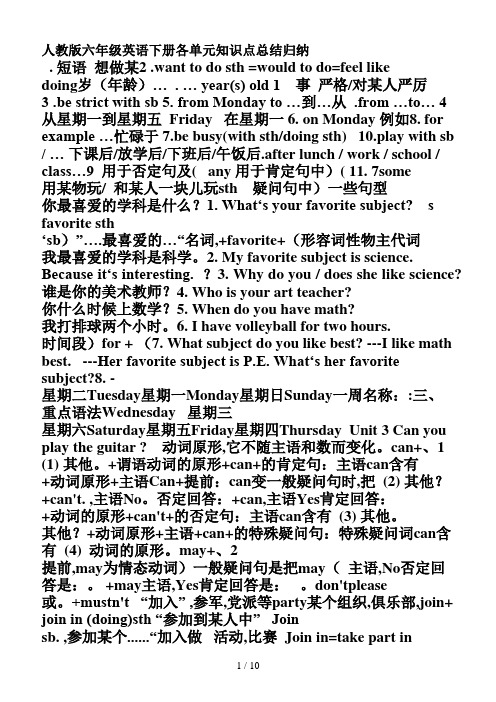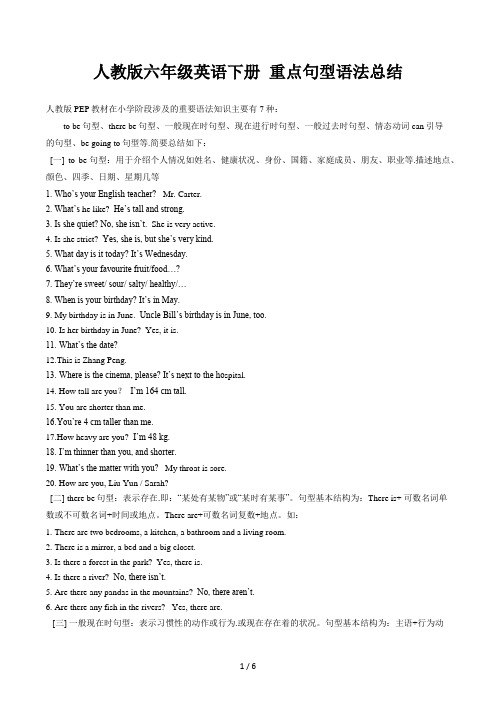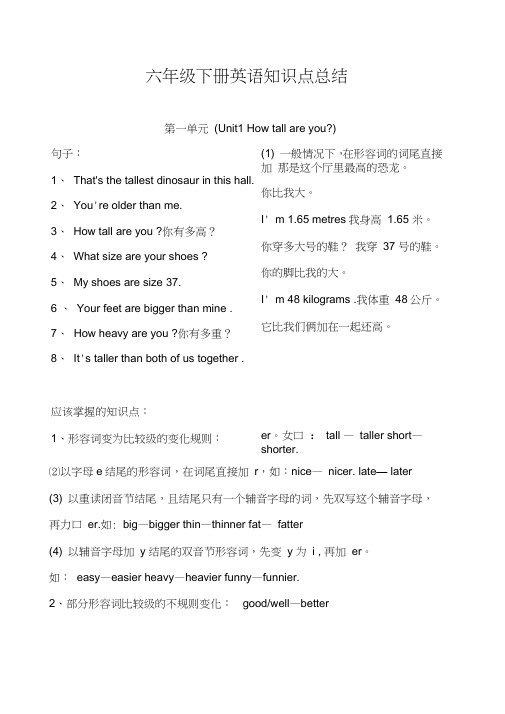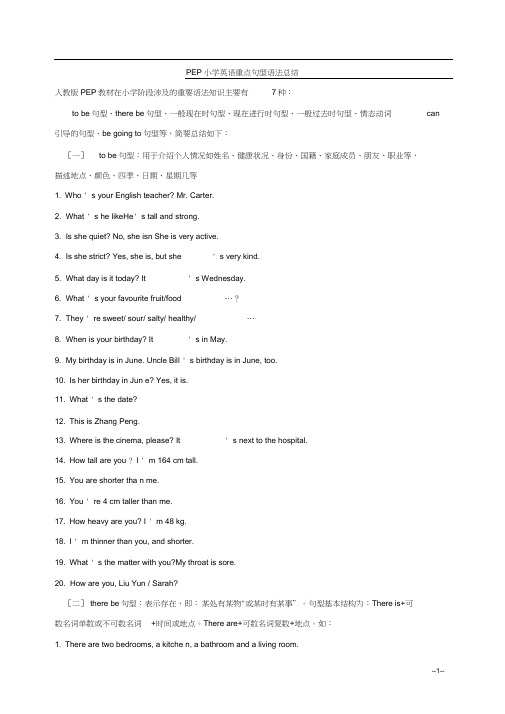人教版六年级英语下册 重点句型语法总结
人教版PEP六年级英语下册知识点整理

人教版PEP六年级英语下册知识点整理第一单元一、单词young—younger更年轻的old -older更年长的tall- taller更高的short-shorter更矮的long-longer更长的thin-thinner更瘦的heavy-heavier更重的big-bigger更大的small -smaller更小的strong -stronger更强壮的二、句子1. That's the tallest dinosaur in this hall.那是这个厅里最高的恐龙。
2. You're older than me.你比我大。
3. How tall are you?你有多高?I'm 1.65 meters.我身高1.65米。
4. What size are your shoes?你穿多大号的鞋。
5. My shoes are size 37.我穿37号的鞋。
6. Your feet are bigger than mine.你的脚比我的大。
7. How heavy are you?你有多重?8. I'm 48 kilograms.我体重48千克。
三、语法复习要点形容词的比较级1、描述词比力级在句子中的应用:两个事物某人的比力用比力级,比力级背面普通带有单词than。
than后的人称代词用主格(白话中可用宾格)。
2.描述词加er的划定规矩:⑴普通在词尾加er;⑵以字母e结尾,加r;如:nice---nicer⑶以一个元音字母和一个辅音字母结尾,应双写末尾的辅音字母,再加er;如:big--- bigger thin---- thinner⑷以“子音字母+y”末端,先把y变i,再加er。
heavy----heavier3.不划定规矩描述词比力级:good/well-better例句:(1)It's taller than both of us together.它比我俩加起来还高。
最新人教版六年级英语下册各单元知识点总结归纳

人教版六年级英语下册各单元知识点总结归纳. 短语想做某2 .want to do sth =would to do=feel likedoing岁(年龄)… . … year(s) old 1 事严格/对某人严厉3 .be strict with sb 5. from Monday to ...到...从 .from ...to (4)从星期一到星期五 Friday 在星期一 6. on Monday 例如8. for example …忙碌于 7.be busy(with sth/doing sth) 10.play with sb / … 下课后/放学后/下班后/午饭后.after lunch / work / school / class…9 用于否定句及( any 用于肯定句中)( 11. 7some用某物玩/ 和某人一块儿玩sth 疑问句中)一些句型你最喜爱的学科是什么?1. What‘s your favorite subject? s favorite sth‘sb)”….最喜爱的…“名词,+favorite+(形容词性物主代词我最喜爱的学科是科学。
2. My favorite subject is science. Because it‘s interesting. ?3. Why do you / does she like science? 谁是你的美术教师?4. Who is your art teacher?你什么时候上数学?5. When do you have math?我打排球两个小时。
6. I have volleyball for two hours.时间段)for + (7. What subject do you like best? ---I like math best. ---Her favorite subject is P.E. What‘s her favorite subject?8. -星期二Tuesday星期一Monday星期日Sunday一周名称::三、重点语法Wednesday 星期三星期六Saturday星期五Friday星期四Thursday Unit 3 Can you play the guitar ? 动词原形,它不随主语和数而变化。
六年级英语(下册)课文重点句子短语

六年级英语(下册)课文重点句子短语六年级英语下册课文重点知识点复习Unit1 Winter Activities一、重点句型1、Did you go anywhere in winter? 你冬天去了哪里?Yes,I went to see my friend 我去看望了我的朋友We listened to music together 我们一起听音乐2、Was it very cold there? 那里很冷吗?Yes, it’s cold and windy. 是的,那里又冷风又大。
3、There was a big ice city. There were many people. 那是个大冰城,那里有很多人。
4、How about you? 你呢?I traveled along the Yangtze River. 我沿着长江旅游5、I took a photo on my mobile. 我在我手机上拍了一照片Show me the photo, please. 请给我看照片Look, here it is. 看,这就是。
6、Look at the snowman. 看这个雪人It ‘s short and fat. 它又矮又胖7、Look at that man 看这个男人He’s tall and thin 他又高又瘦8、Show me the dress, please 请给我看下这条连衣裙Which dress? 哪一条连衣裙The long one 那长的一条9、Show me the skirt, please 请给我看下这条短裙Which skirt? 哪一条短裙The short one 那短的一条10.Very often they get New Year’s money from their parents. 经常,他们从父母那拿到压岁钱11.They have a good time in winter vacation 他们度过了一个美好的寒假时光二、重点短语1、go(went) to 去哪里2、climb(climbed) mountain 爬山3、travel(traveled) along 沿着。
语法详解therebe句型(讲义)人教PEP版英语六年级下册

2024年六年级英语语法详解第九章:There be句型一、构成及含义:【考点精讲】There be . . . 句型表示的是“某处有(存在)某人或某物”,其结构为:There be(is,are,was, were)+名词+地点状语。
例如:There is a pencil in my pencilcase.There are fiftytwo students in our class.There is some juice in the bottle.主谓一致总结:【实战演练】根据所给汉语完成句子。
1. 钱包里有些钱。
There ____ some money in the picture.2. 在吉姆的书包里有一些卡片。
____ _____ some cards in Jim’s bag.3. 我们学校有许多班。
There _____ many _____ in our school.4. 桌子上有一个苹果。
There ____ ____ apple on the desk.5. 在图画里有一个房子。
There ____ ____ house in the picture.二、各种句式:【考点精讲】总结:1. 肯定:There a book on the desk.否定:There a book on the desk.Yes/No Question:a book on. . . ?Yes, there . /No. there .Ah/How Question:What on the . . . ?2. 肯定:There some books on the desk.否定:There some books on the desk. Yes/No Question:some books on. . . ?Yes, there . /No. there .Ah/How Question:What on the . . . ?3. 肯定:There some milk on the desk.否定:There milk on the desk. Yes/No Question:milk on. . . ?Yes, there . /No. there .Ah/How Question:What on the . . . ?【实战演练】句型转换:1. There is a woman near the house.(一般疑问句)2. There are some buses near the hill.(否定句)3. Is there a baby in the room?(陈述句)4. There are some apples in the tree.(否定句)5. There are some buses near the hill.(单数句)过关练习一、用所给词的适当形式填空。
人教版六年级英语下册 重点句型语法总结

人教版六年级英语下册重点句型语法总结人教版PEP教材在小学阶段涉及的重要语法知识主要有7种:to be句型、there be句型、一般现在时句型、现在进行时句型、一般过去时句型、情态动词can引导的句型、be going to句型等.简要总结如下:[一] to be句型:用于介绍个人情况如姓名、健康状况、身份、国籍、家庭成员、朋友、职业等.描述地点、颜色、四季、日期、星期几等1. Who’s your English teacher? Mr. Carter.2. What’s he like? He’s tall and strong.3. Is she quiet? No, she isn’t. She is very active.4. Is she strict? Yes, she is, but she’s very kind.5. What day is it today? It’s Wednesday.6. What’s your favourite fruit/food…?7. They’re sweet/ sour/ salty/ healthy/…8. When is your birthday? It’s in May.9. My birthday is in June. Uncle Bill’s birthday is in June, too.10. Is her birthday in June? Yes, it is.11. What’s the date?12.This is Zhang Peng.13. Where is the cinema, please? It’s next to the ho spital.14. How tall are you?I’m 164 cm tall.15. You are shorter than me.16.You’re 4 cm taller than me.17.How heavy are you? I’m 48 kg.18. I’m thinner than you, and shorter.19. What’s the matter with you? My throat is sore.20. How are you, Liu Yun / Sarah?[二] there be句型:表示存在.即:“某处有某物”或“某时有某事”。
(完整版)人教版六年级下册英语知识点总结

六年级下册英语知识点总结第一单元(Unit1 How tall are you?)句子:1、That's the tallest dinosaur in this hall.2、You're older than me.3、How tall are you ?你有多高?4、What size are your shoes ?5、My shoes are size 37.6 、Your feet are bigger than mine .7、How heavy are you ?你有多重?8、It's taller than both of us together .应该掌握的知识点:1、形容词变为比较级的变化规则:(1) 一般情况下,在形容词的词尾直接加那是这个厅里最高的恐龙。
你比我大。
I' m 1.65 metres我身高1.65 米。
你穿多大号的鞋?我穿37 号的鞋。
你的脚比我的大。
I' m 48 kilograms .我体重48公斤。
它比我们俩加在一起还高。
er。
女口: tall —taller short—shorter.⑵以字母e结尾的形容词,在词尾直接加r,如:nice—nicer. late— later(3) 以重读闭音节结尾,且结尾只有一个辅音字母的词,先双写这个辅音字母,再力口er.如: big—bigger thin—thinner fat—fatter(4) 以辅音字母加y 结尾的双音节形容词,先变y 为i , 再加er。
如:easy—easier heavy—heavier funny—funnier.2、部分形容词比较级的不规则变化:good/well—better3、 比较级的标志:tha n 。
弓I 导比较级的特殊疑问词: Which 。
句子结构为:Which+名词+is+形容词比较级。
比较级+and+比较级表示:越来越 ...4、 A 与 B 比较的句子结构: A+be 动词+形容词比较级 +than+B. 否定句句子结 构:A+be 动词+not+形容词比较级+than+B. —般疑问句句子结构:Be 动词+A + 形容词比较级 +than+B ?A 比B 多多少的句子结构:A+be 动词+数字+单位+形容词比较级+than+B 。
(完整版)人教版六年级英语下册重点句型语法总结

PEP小学英语重点句型语法总结人教版PEP教材在小学阶段涉及的重要语法知识主要有7种:to be句型、there be句型、一般现在时句型、现在进行时句型、一般过去时句型、情态动词can 引导的句型、be going to句型等,简要总结如下:[一]to be句型:用于介绍个人情况如姓名、健康状况、身份、国籍、家庭成员、朋友、职业等,描述地点、颜色、四季、日期、星期几等1. Who ' s your English teacher? Mr. Carter.2. What ' s he likeHe' s tall and strong.3. Is she quiet? No, she isn She is very active.4. Is she strict? Yes, she is, but she ' s very kind.5. What day is it today? It ' s Wednesday.6. What ' s your favourite fruit/food …?7. They ' re sweet/ sour/ salty/ healthy/ …8. When is your birthday? It ' s in May.9. My birthday is in June. Uncle Bill ' s birthday is in June, too.10. Is her birthday in Jun e? Yes, it is.11. What ' s the date?12. This is Zhang Peng.13. Where is the cinema, please? It ' s next to the hospital.14. How tall are you ? I ' m 164 cm tall.15. You are shorter tha n me.16. You ' re 4 cm taller than me.17. How heavy are you? I ' m 48 kg.18. I ' m thinner than you, and shorter.19. What ' s the matter with you?My throat is sore.20. How are you, Liu Yun / Sarah?[二] there be句型:表示存在,即:某处有某物"或某时有某事”。
人教版六年级英语下册知识点梳理完整版

人教版六年级英语下册知识点梳理HEN system office room 【HEN16H-HENS2AHENS8Q8-HENH1688】六年级英语下册知识点梳理Unit 1 How tall are you?一、单元内容简析:本单元内容的中心话题是询问人或事物的年龄、身高、重量以及长度并作比较。
内容涉及恐龙、猴子以及鲸类的比较,学生之间在年龄、身高和体重方面的比较。
1、数字的读法,含有“厘米、千克”单位的读法。
如百以上164:one hundred and sixty-four,学生可能读的时候百后不知加“and”,还有千的读法:thousand,小数的读法等。
2、形容词比较级的用法与变化形式,哪些要双写,哪些要把y变i成再加er,到底在什么情况下变比较级要加上more。
3、代词的用法,特别是名词性物主代词的用法。
四、易考点与易错点:1、词语类:①四会词语在听力部分听写或笔试部分按照汉意写词语。
②按要求写词语:变比较级funny,heavy,big,thin;long的名词,foot,tooth复数,heavy(heavier)的反义词light(er)③very修饰原级,much修饰比较级。
例如:He is very tall. He is much taller than you.2、语法、句型类:①How引导的不同特殊疑问句:How be sb.(问某人状况),How tall/heavy/old be sb./sth(询问身高、体重、年龄)How long/big/large be---(问多长、多大)How many/much(问数量、价格)。
②比较级的运用,一定要是相同内容或类别才可以进行比较,这是学生最易出错和混淆娥地方。
例如:Mike’s legs are longer than (John),如果学生翻译会直接填写John,但是一分析就不难发现应该和John的腿作比较的,所以应该是John’s。
- 1、下载文档前请自行甄别文档内容的完整性,平台不提供额外的编辑、内容补充、找答案等附加服务。
- 2、"仅部分预览"的文档,不可在线预览部分如存在完整性等问题,可反馈申请退款(可完整预览的文档不适用该条件!)。
- 3、如文档侵犯您的权益,请联系客服反馈,我们会尽快为您处理(人工客服工作时间:9:00-18:30)。
PEP小学英语重点句型语法总结人教版PEP教材在小学阶段涉及的重要语法知识主要有7种:to be句型、there be句型、一般现在时句型、现在进行时句型、一般过去时句型、情态动词can 引导的句型、be going to句型等,简要总结如下:[一] to be句型:用于介绍个人情况如姓名、健康状况、身份、国籍、家庭成员、朋友、职业等,描述地点、颜色、四季、日期、星期几等1、Who’s your English teacher?Mr、Carter、2、What’s he lik e? He’s tall and strong、3、Is she quiet? No, she isn’t、She is very active、4、Is she strict? Yes, she is, but she’s very kind、5、What day is it today? It’s Wednesday、6、What’s your favourite fruit/food…?7、They’re sweet/ sour/ salty/ healthy/…8、When is your birthday? It’s in May、9、My birthday is in June、Uncle Bill’s birthday is in June, too、10、Is her birthday in June? Yes, it is、11、What’s the date?12、This is Zhang Peng、13、Where is the cinema, please? It’s next to the hospital、14、How tall are you?I’m 164 cm tall、15、You are shorter than me、16、You’re 4 cm taller than me、17、How heavy are you? I’m 48 kg、18、I’m thinner than you, and shorter、19、What’s the matter with you?My throat is sore、20、How are you, Liu Yun / Sarah?[二] there be句型:表示存在,即:“某处有某物”或“某时有某事”。
句型基本结构为:There is+ 可数名词单数或不可数名词+时间或地点。
There are+可数名词复数+地点。
如:1、There are two bedrooms, a kitchen, a bathroom and a living room、2、There is a mirror, a bed and a big closet、3、Is there a forest in the park? Yes, there is、4、Is there a river? No, there isn’t、5、Are there any pandas in the mountains? No, there aren’t、6、Are there any fish in the rivers? Yes, there are、[三] 一般现在时句型:表示习惯性的动作或行为,或现在存在着的状况。
句型基本结构为:主语+行为动词+其她。
当主语就是第三人称单数时,要在动词原形后面加s或es,其她人称作主语时则用动词原形,在问句及否定句中需要用助动词do或does。
这种句型通常有一些标志词,如:usually often sometimes never always等。
1、What do you have on Thursdays? We have English, math and science on Thursdays、2、What do you do on Saturdays? I watch TV on Saturdays、3、I do my homework、4、What do you have for lunch on Mondays? We have tomatoes, tofu and fish、5、I like fruit、But I don’t like grapes、1、When do you eat dinner? I eat dinner at 7:00 in the evening、2、When do you get up? I usually get up at 12:00 noon、3、What do you do on the weekend? Usually I watch TV and go shopping、4、Sometimes I visit my grandparents、I often play football、Sometimes I go hiking、5、Which season do you like best? I like winter best、6、Why do you like summer/winter?1、How do you go to school, Sarah?2、Usually I go to school on foot、Sometimes I go by bike、3、I like collecting stamps、He likes collecting stamps, too、4、Does she teach math? Yes, she does、5、Does she teach English?No, she doesn’t、She teaches math、6、What does your mother do? What does your father do?7、Where does she work? She works in a car company、8、How does she go to work? She goes to work by bus、9、Where does the rain come from? It comes from the clouds、10、Where does the cloud come from? It comes from the vapour、11、Where does the vapour come from? It comes from the water in the river、12、The sun shines and the water becomes vapour、13、How do you do that?1、My nose hurts、2、How do you feel? I feel sick、How does Amy feel?3、You look so happy、You look sad today、[四] 现在进行时句型:表示说话时正在进行的动作或事件,或在短期内正在进行的动作或存在的情况。
标志词就是:now 也常用在Look! Listen!等后面。
句型主要结构为:be动词(am, is, are)+动词现在分词(v、ing)。
1、What are you doing? I’m doing the dishes、I’m reading a book、2、Grandpa is writing a letter、Brother is doing homework、Mom is cooking dinner in the kitchen、3、He is writing an e-mail in the study、3、What is it doing ? It’s eating bananas、4、What is she doing ? She’s jumping、5、What are they doing ? They’re swimming、They’ re climbing trees、6、Are you eating lunch? No, we aren’t、7、Are they eating the honey? Yes, they are、8、Is he playing chess? Yes, he is、9、Is she counting insects? No, she isn’t、[五] 一般过去时句型:表示过去发生的而现在已经结束的事件、动作或情况。
句型基本结构为:主语+动词过去式+其她。
标志词通常就是:yesterday, last week , last year 等,在问句与否定句中要用助动词did。
1、What did you do last weekend? I played football、2、Did you help them clean their room? Yes, I did、3、What did you do yesterday? I went fishing、4、Did you read book? Yes, I did、5、Did you clean your room? No, I didn’t、6、Where did you go on your holiday? I went to Xinjiang、7、What did you do there? I sang and danced with my new friends、8、How did you go there?I went by train、此外,一般过去时也可用来表示客气的询问。
如:What would you like for lunch? I’d like some…[六] 情态动词can引导的句型:表示有能力做某事,can后面的动词要用原形。
如:1、What can you do? I can sweep the floor、I can cook the meals、2、I can water the flowers、3、Can you make the bed? No, I can’t、4、Can you use a computer? Yes, I can、How can I get to Zhongshan Park? You can go by the No、15 bus、[七] 将来时:我们的教材中出现过两种表示将来时的句型,即:will与be going to句型,主要以be going to句型为主,表示将要做某事或打算做某事。
